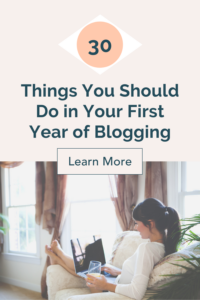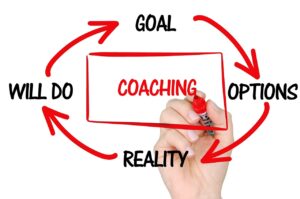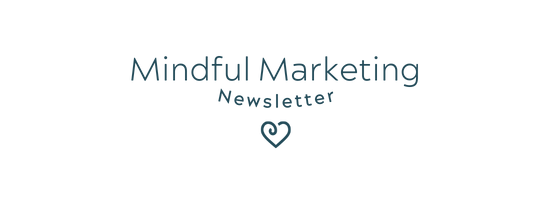If you’re a blogger, then you know that there’s always more to learn. But if you’re just starting out, the learning curve can seem pretty steep. That’s why I put together this list of 30 things you need to do in your first year of blogging.
Whether it’s learning how to use social media to promote your blog, or figuring out the best way to structure your posts, I’ve got you covered. Get ready to take your blogging skills up a notch or two!
Looking for a reliable framework to build, grow and monetize your blog or online business? Watch this free on-demand masterclass on the framework for a money making blog.
Table of Contents
Toggle30 things you should do by the time you’ve been blogging for one year:

1. Decide how to monetize
This is the very first thing you should do when you are starting a blog. Lots of new bloggers find this question super intimidating, and prefer to try a lot of things out to see what works out.
This is a risky and time consuming approach. If you know how you want to monetize from the start, you can build an audience who will love your products from the very beginning.
2. Set up your site on WordPress and decide loosely on a tagline
I highly recommend self-hosting on WordPress.org from the very beginning, as opposed to WordPress.com, which will have a lot of limitations. Squarespace is also a good option.
My favorite host is Flywheel.
3. Create loose branding – color group and font pairing
This is important, because it will allow people to visually identify who you are and what you are about. However, I say “loosely” because you don’t want to be spending thousands of dollars on branding before you are totally sure how you’ll be making money and where your traffic will be coming from.
I recommend choosing a few colors that complement each other, as well as two fonts (headline and body copy) that you like. Let that be your branding for now, until you are really ready for something more specific.
4. Balance short term goals and long term goals
With blogging, a lot of your big and passive income will come in the long term, as you get more traffic, visibility, and subscribers.
I recommend balancing out long term strategies with a pricier product (like coaching or mastermind programs) that you can launch alongside your blog, so that you can start bringing in a good income from the beginning, without sacrificing long term, passive income.
5. Learn to trust your desires and your purpose and mission
It might sound crazy, but this is one of the most important parts of journey with blogging.
Staying aligned with your desires, purpose, and mission will keep you going in the long-run!
The desires that you have – to make more money, to travel more, to fulfill your purpose – those desires were given to you by a higher power, and it’s not selfish to pursue them.
6. Have an SEO strategy focused on your monetization methods
While you don’t really need to run out and buy a course on search engine optimization, you should definitely learn enough to be dangerous, so to speak!
In Step One, you decided how you plan to monetize. Now, you should be sure to focus your writing and SEO efforts on content that will draw in readers that will be interested in what you plan to sell.
7. Narrow down your categories and create content clusters for SEO
Decide on 5 categories for your blog that will be your main categories (which should in some way relate to each other at least a little bit). Then, plan at least 5 blog posts for each category.
This will be a great start to help both your readers and Google understand who you are and what you do.
8. Start a Pinterest account
Pinterest isn’t what it used to be for bloggers, but it’s still the best way to gain some traffic in the short term. I recommend starting a Pinterest account and creating a few pins for each of your blog posts. That will start to bring in traffic more quickly that search engine optimization, and also begin to build your Pinterest SEO.
9. Create one social media account in addition to Pinterest
Pinterest is low-=hanging fruit as far as traffic is concerned for most bloggers. Of course there are some niches where Pinterest searches will be low or non-existent, but it’s still a good idea to create pins for each new blog post you publish.
A lot of blogger ask me: what social media should I use? And my recommendation: is to choose just ONE other platform to focus on until your traffic starts picking up. Social is great for building trust, but will rarely be a game changer for traffic, so I don’t recommend hugely prioritizing it early on.
10. Email marketing tool
As a blogger or influencer who is subject to algorithm changes – some which will benefit you, and some which will be to your detriment – you MUST focus on building an email list.
My recommendations are either ActiveCampaign or Mailerlite. Mailerlite is you insist on having a free option, or ActiveCampaign if you’re willing to pay $9 monthly for a tool that is much more sophisticated.
11. A way to create landing pages for sales pages and opt ins
You also need some kind of page building tool. You can do this on WordPress using a multitude of free page builders (like elementor) or you can invest in a tool that will give you fancy capabilities like split testing, or even taking payments (like Leadpages).
Either way, you need a way to be able to DESIGN standalone pages on your site.
12. Create a free offer opt in
In order to grow your email list like I mentioned earlier, you will have to bribe your readers to give you their email in exchange for something you give them for free.
This is called a lead magnet, or free offer opt in.
13. Automate a welcome sequence
After you bribe someone for their email address, you then have to communicate with them 🙂
I recommend you do this in an automated way, by way of what’s called a welcome sequence or nurture sequence. You will use your email marketing tool to do this.
14. Market research and conversations
After you have all these foundations in place, you need to start having conversations with your audience. You probably have some ideas on what your readers want and need which is why you started blogging.
But now, we want to start getting clarity on what they want to buy!
15. Learn the art of storytelling
One of the most important skills you can learn as a writer is storytelling. Telling a good story is a way to engage your readers and keep them interested in what you have to say.
There are many techniques you can use to make your stories more interesting, and by following these tips, you can create narratives that will capture your readers’ attention from beginning to end.
16. Network with other bloggers
One great way to build your blog audience is to network with other bloggers. There are a number of ways to do this, including commenting on their blogs, following them on social media, and even interviewing them.
Not only will you be able to broaden your reach by networking with other bloggers, but you may also learn some valuable information and tips.
17. Invest in your knowledge in your first year of blogging
Not only will this help you hone your skills, but it will also give you access to insider tips and advice from experts in the field.
This can be an invaluable resource as you continue to grow your blog. Additionally, attending live blogging events and networking with other bloggers can help you learn from their experiences and get inspiration for your own work.
18. Master blog post best practices
Blogging is a medium that allows for a high degree of creativity and flexibility, but that doesn’t mean you can get away with sloppy writing.
To make sure your posts are effective and engaging, follow some basic best practices.
19. Learn how to balance content creation with marketing and sales
As a blogger, it’s important to strike a balance between creating great content and promoting your blog and its content. While it’s important to market your blog and drive traffic back to your site, you don’t want to do so at the expense of the quality of your posts.
20. Get clear on your strengths and the first person you want on your team
Everyone has unique strengths and weaknesses. As a blogger, it’s important to know what your strengths are and play to them.
Additionally, it’s helpful to have a clear idea of the first person you want on your team – whether that’s an editor, social media expert, or content marketer.
Track your time, track what brings you joy, and decide the first set of tasks you want off your plate.
21. Set goals for one year, 5 years and life vision
It’s important to have goals for your blog, both in the short and long term. By setting goals and working towards them, you’ll be able to measure your progress and ensure that your blog is moving in the right direction.
The goals excite you when starting, and the vision keeps you going for the long term.
22. Learn when to pivot versus when you’re having FOMO or other fear (having a coach helps)
As a content creator in your first year of blogging, you’ll likely encounter times when you feel like you need to pivot your blog in a new direction or that you’re experiencing FOMO (fear of missing out). While it’s important to be flexible and open to change, you don’t want to make changes just for the sake of it.
Having a blog coach can help you figure out when it’s time to make a change and when you’re simply experiencing fear.
23. Look for guest posting opportunities
Guest posting can be a great way to reach a new audience and build your blog’s reputation. By guest posting on high-quality sites, you can introduce your blog to a new group of readers and gain exposure to new ideas.
24. Seek guest bloggers
Guest blogging can be a great way to reach a new audience and build your blog’s reputation.
By guest posting on high-quality sites, you can introduce your blog to a new group of readers and gain exposure to new ideas. Guest bloggers can also help you keep your blog fresh and up-to-date.
25. Create your first thing to sell
As a blogger, you may eventually want to create and sell your own products or services. This can be a great way to monetize your blog and generate additional income.
By creating your own product or service, you’ll be able to control the quality and ensure that your readers are getting the best possible product.
26. Know your data
It’s important to track the progress of your blog in your first year of blogging by tracking data and analytics. This information can help you figure out what content is resonating with your readers and identify areas where you need to make changes.
By tracking data, you’ll be able to improve the effectiveness of your blog.
27. Gain confidence by working on mindset
One of the biggest challenges bloggers face is lack of confidence. This can be a major hurdle in terms of creating quality content and growing your blog.
By working on your mindset and developing a positive attitude, you’ll be able to overcome this challenge and become a successful blogger.
28. Create a tagline for your blog
A tagline is a short, catchy phrase that sums up what your blog is about.
By having a tagline, you’ll be able to quickly and easily explain what your blog is about to potential readers.
Additionally, a tagline can help brand your blog and make it easier for readers to remember.
29. Work on your blog site speed
Site speed is an important factor that affects both readers and Google rankings. By working on your site speed, you’ll be able to ensure that your readers have a positive experience and that your blog is ranked higher by Google.
Additionally, site speed is an important factor for SEO.
30. Review your year and celebrate your successes
At the end of every year, it’s important to take some time to review your accomplishments and celebrate your successes. T
his can help you stay motivated and continue working towards your goals.
By reflecting on your successes, you’ll be able to identify what worked well and what you need to improve on in the future.






